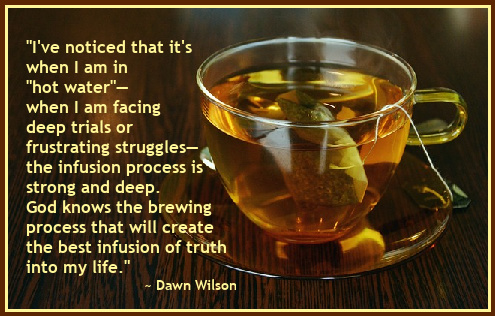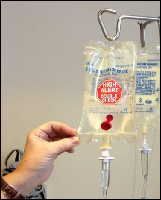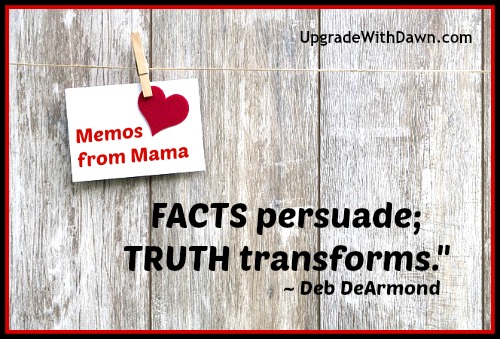The Infusion We Desperately Need
In this Biblical Thinking UPGRADE, Dawn reminds us of the power of the Word of God when it is "infused" into our lives.
I'm a tea-drinker, not a coffee-drinker. I love the smell of coffee, but the taste makes me gag every time. (I don't even like coffee-flavored desserts or ice cream.)
I love hot teas—I get a strange calming satisfaction out of watching tea from a tea bag infuse into hot water. When we place a tea bag in hot water, the water has more energy. The molecules in this steeping process move around faster and this helps start the diffusion of the tea leaves in the tea bag, making a strong brew.
There's another kind of infusion that I'm grateful for, but I don't especially like it. Chemo infusions help me stay alive by killing off rogue cancer cells—cells that might destroy me.
me stay alive by killing off rogue cancer cells—cells that might destroy me.
I thought a lot about these two kinds of infusions as I went through the process of CAR T-cell therapy. There were many days of infusions before that process, and more afterward. Besides the physical side effects, the enemy tried to discourage me emotionally.
But during those infusions, I wanted to have powerful "infusions" from the Word of God to help me cope with tough days—infusions I desperately needed.
Be Blessed by Truth Infusions
I find at least three blessings come from "truth infusions" of scriptures. These blessings are for anyone who turns to the Word of God for help.
1. The Word of God infuses our hearts with truth and gives us life.
In a world of chaos and confusion, God's Word infuses us with truth—not mere head-knowledge, but rather, life-transforming truth. The Word is "God-breathed." Although men of God wrote down the words, the Bible itself claims that the words of scripture are from God (2 Peter 1:21; 1 Corinthians 2:12-13).
The Holy Spirit teaches us the Word to help us and change us.
I've noticed that it's when I am in "hot water"—when I am facing deep trials or frustrating struggles—the infusion process is strong and deep. God knows the brewing process that will create the best infusion of truth into my life.
Isaiah 41:13 reminds us that in our struggles, God will give us chazaq—a "continual infusion of His strength and power." (The word "hold" in this verse is chazaq in Hebrew, and it means to have our strength renewed by the addition of God's strength.)
Oh, how we need God's strengthening, life-giving power!
I've always loved the story of Ezekiel and the "dry bones." Ezekiel said, "This is what the Sovereign LORD says to these bones: I will make breath enter you, and you will come to life" (Ezekiel 37:5). God breathed life—infused life—into God's people in the Old Testament. And He will do that for Christ-followers too.
2. The Word of God exposes our sins and the toxic things we believe.
As I read the Bible during my chemo infusions, or meditated on scriptures I'd memorized, God pointed out some areas where I still struggle trusting God consistently. The scripture confrontations were uncomfortable; but I need healing from sin, not just cancer, so I was grateful.
As we read, study, and memorize scriptures—hide it in our hearts—we learn how to resist sin. God uses the Word to reveal our hidden sins. He turns the light on in the dark corners of our hearts.
The authoritative Word is useful to teach, rebuke, and correct us, and to train us in rightousness. In doing so, the Word of God teaches people how to be rightly related to God.
In a bit of a rabbit trail . . . I read some powerful words written by Bobbie Wolgemuth to Joni Eareckson Tada. Bobbie was the first wife of Robert Wolgemuth (Robert is now married to Nancy DeMoss Wolgemuth). Bobbie wrote about the infusion of God through sufferings—words that deeply resonated in my heart.
Bobbie said:
". . . just as chemo medicine is designed to kill the bad cancer cells, so God designs a toxic, painful trial to destroy and starve and kill anything in my soul that is selfish, unholy, or offensive to Him. I willingly surrender to HIS INFUSION (emphasis mine), knowing that He has chosen what will ultimately bring me more abundant life—more abundant life than I can ever imagine.
"So I choose to open my hands and my heart and offer my veins to be infused with His choice of trial so that I might receive His beauty and His perfect health." *
The Word of God exposes our sins to us, but sufferings allowed by our loving Father also can reveal how sinful we are—and both the Word and sufferings from His hand are tools in our becoming more like Christ.
3. The Word of God, used by the Spirit of God, infuses our lives with all we need to serve the Lord.
The Bible has supernatural ability to transform us and make us complete—"thoroughly equipped" to do good works and serve God.
Lord willing, I'll have more years to serve the Lord. I've been a Christian for more than 50 years, but I still need the Word of God to infuse my life and prepare me for daily service to my King.
I've noticed over the years that sometimes my spiritual life feels "dry."
It's during times of spiritual dryness that I most need an infusion of God's Word.
When I am most thirsty for living water, I find that I'm actually longing for Jesus and the empowering of the Holy Spirit in my life. My thirst is often quenched and my heart prepared to worship and serve God when I am infused by the precious truths of scripture about the Trinity and how God works in my life.
Infusions of the Word of God are the infusions we desperately need:
- when life falls apart,
- when challenges get tough,
- when our hearts hurt, and
- when we don't feel close to God.
But we shouldn't only "receive those infusions" in hard times. Daily infusions of the Bible prepare us to surrender to God's will and serve Him with all our hearts—no matter our circumstances.
Have you had an infusion today? Do you need to make an appointment with God in His Word?
Dawn Wilson, founder and President of Heart Choices Today, is a speaker and author,  and the creator the blog, Upgrade with Dawn. She is a contracted researcher/reviewer for women's teacher and revivalist, Nancy DeMoss Wolgemuth at Revive Our Hearts, and is a regular columnist at Crosswalk.com. She and her husband Bob live in sunny Southern California, and Dawn has traveled with Him in Pacesetter Global Outreach. They have two grown, married sons, three granddaughters and a rascally maltipoo, Roscoe.
and the creator the blog, Upgrade with Dawn. She is a contracted researcher/reviewer for women's teacher and revivalist, Nancy DeMoss Wolgemuth at Revive Our Hearts, and is a regular columnist at Crosswalk.com. She and her husband Bob live in sunny Southern California, and Dawn has traveled with Him in Pacesetter Global Outreach. They have two grown, married sons, three granddaughters and a rascally maltipoo, Roscoe.
Graphic 1 adapted, courtesy of Conger Design at Pixabay.
Graphic 2, courtesy of Klbz at Pixabay.
* Quote by Bobbie Wolgemuth in the interview, "How Much Pain Is Enough?"
 Post a Comment → Posted on
Post a Comment → Posted on  Tuesday, March 21, 2023 at 2:00PM
Tuesday, March 21, 2023 at 2:00PM 













